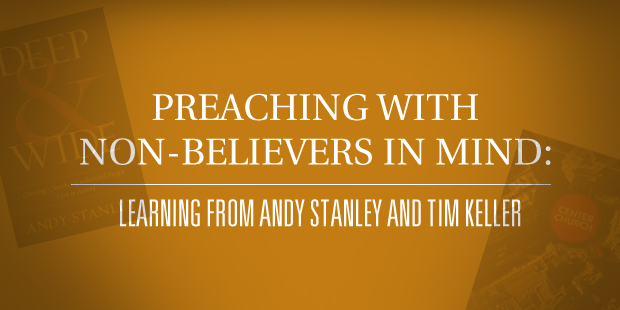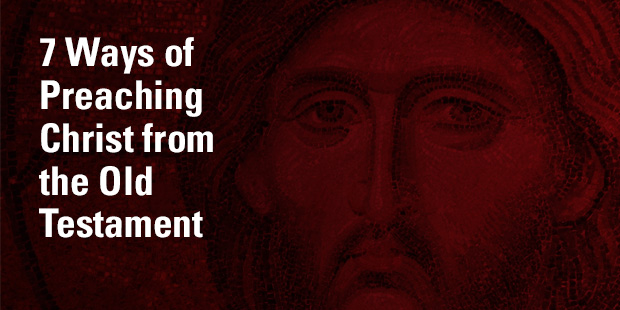Last year, I read Andy Stanley’s Deep & Wide: Creating Churches Unchurched People Love to Attend and Tim Keller’s Center Church: Doing Balanced, Gospel-Centered Ministry in Your City back to back. An odd combination, I know.
These two pastors come from different contexts (Atlanta vs. New York) and different theological streams (Baptistic non-denominational vs. confessional Presbyterian). What’s more, they approach ministry from different starting points, then employ different methods to achieve their purposes.
Despite all these differences, there is one thing Stanley and Keller agree on: preachers ought to be mindful of the unbelievers in their congregation.
Different Reasons for the Same Practice
Stanley and Keller may be worlds apart in terms of their theological vision for ministry, but they both maintain that a preacher should consider the unsaved, unchurched people in attendance.
This doesn’t mean we can’t find differences even in this area. For example, Stanley uses the terminology of “churched” and “unchurched” (which makes sense in the South), whereas Keller’s context leads him to terms like “believers” and “non-believers.”
Likewise, Stanley and Keller engage in similar practices from different vantage points. Stanley’s purpose for the weekend service is to create an atmosphere unchurched people love to attend. Keller believes evangelism and edification go together because believers and unbelievers alike need the gospel. He writes:
“Don’t just preach to your congregation for spiritual growth, assuming that everyone in attendance is a Christian; and don’t just preach the gospel evangelistically, thinking that Christians cannot grow from it. Evangelize as you edify, and edify as you evangelize.”
Whether you are closer to Stanley’s paradigm for ministry or Keller’s, you can benefit from a few suggestions for how to engage the lost people listening to you preach.
1. Acknowledge and welcome the non-believers in attendance.
Both Stanley and Keller mention the non-believers who are present. They go beyond a vague, quick welcome at the beginning of the service. Instead, these two pastors acknowledge that even though the non-believers may be uncomfortable, the church members are glad they are present. Here’s the way Stanley does it:
“If you are here for the first time and you don’t consider yourself a religious person, we are so glad you are here. Hang around here long enough and you will discover we aren’t all that religious either.”
“If you don’t consider yourself a Christian, or maybe you aren’t sure, you could not have picked a better weekend to join us.”
“If this is your first time in church or your first time in a long time, and you feel a little uncomfortable, relax. We don’t want anything from you. But we do want something for you. We want you to know the peace that comes from making peace with your heavenly Father.
“If this is your first time in church, or your first time in a long time, and you feel out of place because you think we are all good people and you are not so good, you need to know you are surrounded by people who have out-sinned you ten to one. Don’t let all these pretty faces fool you.”
Keller lets this kind of acknowledgement seep into his sermon preparation. He recommends the pastor address different groups directly, “showing that you know they are there, as though you are dialoguing with them.” Here’s an example:
“If you are committed to Christ, you may be thinking this – but the text answers that fear…”
“If you are not a Christian or not sure what you believe, then you surely must think this is narrow-minded – but the text says this, which speaks to this very issue…”
2. Assume the non-believers in attendance need help in approaching the Bible.
For Stanley, this means explaining how to follow along with the biblical text for the sermon. It also means you teach about the Bible as you teach the Bible.
Here’s an example. Instead of saying “The Bible says…,” cite the authors instead. This way, you are giving information about who wrote the books of the Bible.
- Option 1 – The Bible says that Jesus rose from the dead after being in the tomb for three days.
- Option 2 – Matthew, an ex-tax collector who became one of Jesus’ followers, writes that Jesus rose from the dead and he claimed to have seen him. Not only that, Luke, a doctor who interviewed eyewitnesses, came to the conclusion that Jesus rose from the dead. He was so convinced he gave up his practice and became a church planter…
Option 2 is better because it doesn’t assume people know everything about the Bible. We should “always start on the bottom rung of the ladder.”
Likewise, Keller suggests pastors think carefully about the audience’s premises. He writes:
“Don’t assume, for example, that everyone listening trusts the Bible. So when you make a point from the Bible, it will help to show that some other trusted authority (such as empirical science) agrees with the Bible.”
While Keller’s approach is not fundamentally geared toward seekers, he still commends a seeker-comprehensible approach to worship that carefully explains the elements of the worship service.
- Seek to worship and preach in the vernacular.
- Explain the service as you go along.
- Directly address and welcome nonbelievers.
- Consider using highly skilled arts in worship.
- Celebrate deeds of mercy and justice.
- Present the sacraments so as to make the gospel clear.
- Preach grace.
3. Challenge non-believers to engage the Bible by acknowledging the oddity of Christian belief and practice.
Keller believes that proper contextualization will cause the preacher to consider the way the message will fall on the ears of those in attendance. He writes:
“We must preach each passage with the particular objections of that people group firmly in mind.”
Hence, the use of “apologetic sidebars” in the sermon. Keller’s approach is to devote one of the three or four sermon points mainly to the doubts and concerns of nonbelievers.
Stanley makes a similar point:
“As a general rule, say what you suspect unbelievers are thinking. When you do, it gives you credibility. And it gives them space.”
When dealing with stringent moral commands in Scripture, Stanley will say things like:
“Today’s text may make you glad you aren’t a Christian! You may put it off indefinitely after today.”
He claims that whenever you give non-Christians an “out,” they often respond by leaning in.
Stanley uses humor as a way of disarming the audience and pushing them to engage the Bible on their own. In seeking to demolish their excuses, he will say things like, “You don’t have to believe it’s inspired to read it.” Or “You should read the Bible so you will have more moral authority when you tell people you don’t believe it.”
Likewise Keller recommends acknowledging common objections and treating the skeptics with dignity:
“Always show respect and empathy, even when you are challenging and critiquing, saying things such as, ‘I know many of you will find this disturbing.’ Show that you understand. Be the kind of person about whom people conclude that, even if they disagree with you, you are someone they can approach about such matters.”
4. Use cultural commonalities to point out worldview inconsistencies.
Keller recommends that all pastors look for two kinds of beliefs:
- “A” beliefs – beliefs people already hold that, because of God’s common grace, roughly correspond to some parts of biblical teaching.
- “B” beliefs – what may be called “defeater” beliefs – beliefs of the culture that lead listeners to find some Christian doctrines implausible or overtly offensive.
He explains why this is important:
One of the reasons we should take great care to affirm the “A” beliefs and doctrines is that they will become the premises, the jumping-off points, for challenging the culture… Our premises must be drawn wholly from the Bible, yet we will always find some things in a culture’s beliefs that are roughly true, things on which we can build our critique. We reveal inconsistencies in the cultural beliefs and assumptions about reality. With the authority of the Bible we allow one part of the culture – along with the Bible – to critique another part.
Conclusion
There’s no denying the significant differences between Andy Stanley and Tim Keller when it comes to theology and ministry. But we can learn from them both in how to respectfully engage the unsaved people in our midst. Keller is right:
We must avoid turning off listeners because we are cultural offensive rather than the gospel… On the other hand, our message and teaching must not eliminate the offense, the skandalon, of the cross. Proper contextualization means causing the right scandal – the one the gospel poses to all sinners – and removing all unnecessary ones.
Read more from Trevin here.

Tags: Andy Stanley, Evangelism, Scripture, Tim Keller, Worship
|
What is MyVisionRoom? > | Back to Culture >































